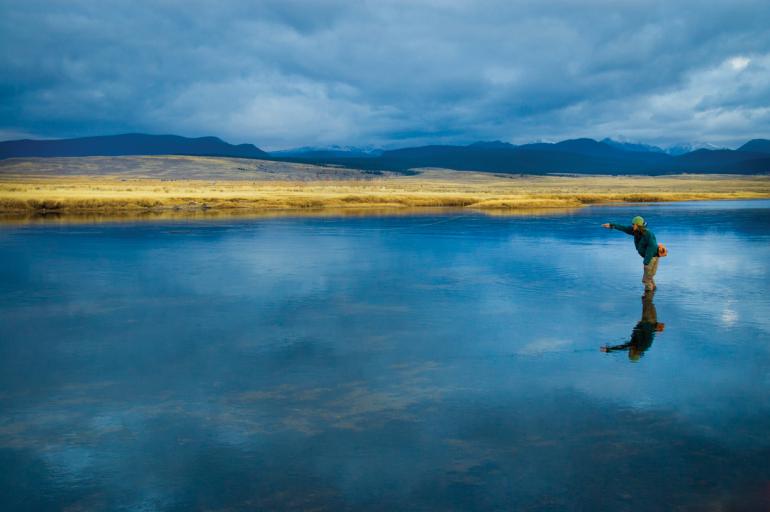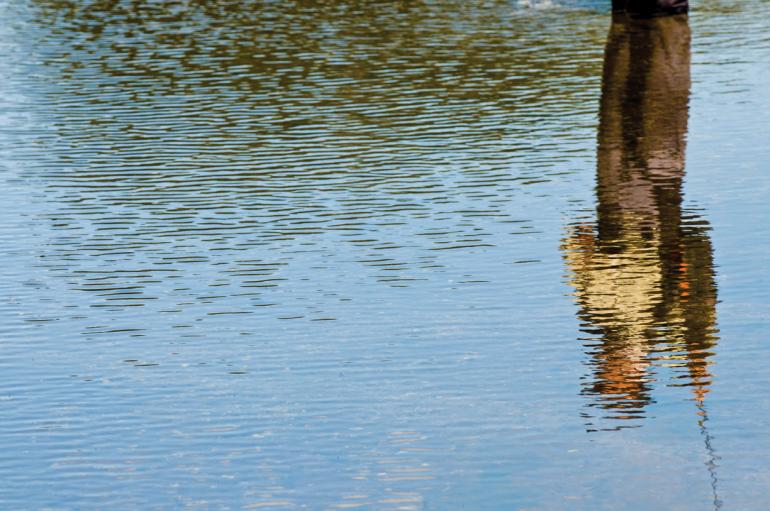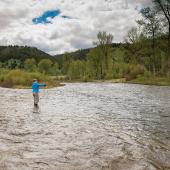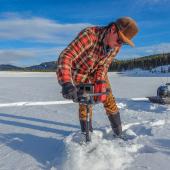Ice Out
It was the kind of winter that keeps you indoors. A sullen one, with low clouds in the sky, clouds that threaten snow, but do not produce. The mountains were cloaked, buried in fluffy grayness; but down on the valley there was only a high, gray sky. All winter you wished it would do something, but the snow fell in the mountains, not on the valley floor. Good for mule deer and antelope, maybe, but for a person who loves snow, who likes to ice fish, not so good. There hasn’t been enough ice on the low lakes to fish in years. ’Ninety-three was the last time—the ice was thick on the lake and you caught ling and walleye as long as your forearm and stayed up all night toasting each catch with chilled schnapps.
But now it is spring, and there are the first few strands of green out there in the brown: threads of promise, of summer coming and better fishing ahead. Ice fishing is one thing, but summer is another. The month warms, and you find yourself rolling up your shirtsleeves a few days and thinking about fishing. One day you try your luck down on the river, where the water is still clear and pre-runoff. You catch two small rainbows, stockers probably, and you sit on the banks of the river and listen to the geese coming back, and you watch shorebirds scold you as you make your way along the bank. A few of the willows are starting to bud out, and every day it seems as if those patches of grass are getting a bit greener, a bit thicker.
Those two stocker rainbows are the first fish of the year and they’ll have to carry you. For that night, after you’ve eaten the tenderloin from the elk calf you shot last fall, the rain comes. You were anxious and eager, and fired up the barbecue grill, anticipating that season, but perhaps you jinxed it, for the rain comes and it falls hard all night, pounding on the roof.
In the high country, it melts the snow, and in the morning, the river is up and chocolate and slamming hard against the Main Street Bridge. The river rises more the next day, and more the next. Despite the fact that there was no snow in the valley this winter, the mountains have lots, and it comes fast. A friend in town who owns a place a few blocks off the river makes a run to the hardware store for some sandbags, and you spend an evening helping him build a wall between his property and the neighbor’s. And you wait.
You wait for the forest road to open, for those gates to swing back and for the first trucks to roll up the road to the trailheads. One morning you sip your coffee and read the paper and see the best news you’ve seen in months. It’s a short story, more of a notice than a story. The road will open this weekend.
You pack a healthy lunch and scratch the dog behind the ears and dig your gaiters and snowshoes out of the basement. The road may be open, but you know in the trees, in the thick darkness off the lodgepoles, there will be mounds of snow, big waves of it, and you’ll have to ride over those waves on snowshoes. You even grab a set of ski poles.
The hike starts in mud where meltwater threads down the trail. Yours are the first sets of tracks on the trail this season. Yours and the dog’s, as he romps happily in drifts, showing the kind of enthusiasm that makes you realize you’ll always have a dog if only to cheer you through a cloudy snowless winter. You hike for an hour in mud and snow until you hit snowline, and then you post-hole for a while, dropping down not more than six inches at a time into snow the consistency of those flavored cones they sell during the summer carnival. Finally you give up and dig out the snowshoes. Now you make some progress, and the dog follows behind because his wide, hairy feet aren’t wide enough. By mid-day, you make the lake and it’s like you thought: still under ice except for a small channel that threads out into the middle, a channel not more than four feet wide from the inlet to the middle.
You’re packing Panther Martins, and you cast out there, but your aim is not good, and the lure lands on the ice. You tug it a bit, and the lure drops into the channel and you crank the handle of the reel and there’s a bite. You set the hook, and the fish dives down deep, taking line, but you make progress and finally land him. A twelve-inch cutthroat, winter-skinny, but good enough to eat. You cast again, and get another. And again. And so it goes. By the time the sun dips behind the ridge, you have your limit and there’s a chill on the west wind that reminds you that winter is not too distant, not too gone. You call the dog and grab your fish and start for home.
Winter can go now. It’s time to fish.
This story is taken from Blue Lines, published by Riverbend. For more information, visit tomreedbooks.com or riverbendpublishing.com.












